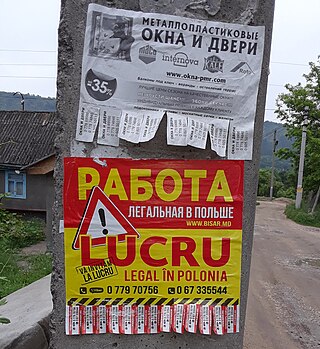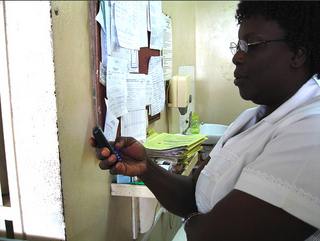Related Research Articles
Hawala or hewala, originating in India as havala, also known as havaleh in Persian, and xawala or xawilaad in Somali, is a popular and informal value transfer system based on the performance and honour of a huge network of money brokers. They operate outside of, or parallel to, traditional banking, financial channels and remittance systems. The system requires a minimum of two hawaladars that take care of the "transaction" without the movement of cash or telegraphic transfer. While hawaladars are spread throughout the world, they are primarily located in the Middle East, North Africa, the Horn of Africa and the Indian subcontinent. Hawala follows Islamic traditions but its use is not limited to Muslims.

A money order is a directive to pay a pre-specified amount of money from prepaid funds, making it a more trusted method of payment than a cheque.

A prepaid mobile device, also known as a pay-as-you-go (PAYG), pay-as-you-talk, pay and go, go-phone, prepay or burner phone, is a mobile device such as a phone for which credit is purchased in advance of service use. The purchased credit is used to pay for telecommunications services at the point the service is accessed or consumed. If there is no credit, then access is denied by the cellular network or Intelligent Network. Users can top up their credit at any time using a variety of payment mechanisms.

A remittance is a non-commercial transfer of money by a foreign worker, a member of a diaspora community, or a citizen with familial ties abroad, for household income in their home country or homeland. Money sent home by migrants competes with international aid as one of the largest financial inflows to developing countries. Workers' remittances are a significant part of international capital flows, especially with regard to labor-exporting countries.
Mobile banking is a service provided by a bank or other financial institution that allows its customers to conduct financial transactions remotely using a mobile device such as a smartphone or tablet. Unlike the related internet banking it uses software, usually called an app, provided by the financial institution for the purpose. Mobile banking is usually available on a 24-hour basis. Some financial institutions have restrictions on which accounts may be accessed through mobile banking, as well as a limit on the amount that can be transacted. Mobile banking is dependent on the availability of an internet or data connection to the mobile device.
Safaricom PLC is a listed Kenyan mobile network operator headquartered at Safaricom House in Nairobi, Kenya. It is the largest telecommunications provider in Kenya, and one of the most profitable companies in the East and Central Africa region. The company offers mobile telephony, mobile money transfer, consumer electronics, ecommerce, cloud computing, data, music streaming, and fibre optic services. It is most renowned as the home of M-PESA, a mobile banking SMS-based service.

Euronet Worldwide is an American provider of global electronic payment services with headquarters in Leawood, Kansas. It offers automated teller machines (ATM), point of sale (POS) services, credit/debit card services, currency exchange and other electronic financial services and payments software. Among others, it provides the prepaid subsidiaries Transact, PaySpot, e-pay, Movilcarga, TeleRecarga and ATX.

mHealth is an abbreviation for mobile health, a term used for the practice of medicine and public health supported by mobile devices. The term is most commonly used in reference to using mobile communication devices, such as mobile phones, tablet computers and personal digital assistants (PDAs), and wearable devices such as smart watches, for health services, information, and data collection. The mHealth field has emerged as a sub-segment of eHealth, the use of information and communication technology (ICT), such as computers, mobile phones, communications satellite, patient monitors, etc., for health services and information. mHealth applications include the use of mobile devices in collecting community and clinical health data, delivery/sharing of healthcare information for practitioners, researchers and patients, real-time monitoring of patient vital signs, the direct provision of care as well as training and collaboration of health workers.

Rebtel is a Swedish technology company founded in 2006 by Hjalmar Winbladh and Jonas Lindroth. With its roots in international calling, it sells products and services to migrants and international nomads. Its services include international calling, messaging, and mobile money delivered in applications for Android, iPhone, and Windows Phone.

A mobile phone is a portable telephone that can make and receive calls over a radio frequency link while the user is moving within a telephone service area, as opposed to a fixed-location phone. The radio frequency link establishes a connection to the switching systems of a mobile phone operator, which provides access to the public switched telephone network (PSTN). Modern mobile telephone services use a cellular network architecture and therefore mobile telephones are called cellphones in North America. In addition to telephony, digital mobile phones support a variety of other services, such as text messaging, multimedia messagIng, email, Internet access, short-range wireless communications, satellite access, business applications, video games and digital photography. Mobile phones offering only basic capabilities are known as feature phones; mobile phones which offer greatly advanced computing capabilities are referred to as smartphones.

M-PESA is a mobile phone-based money transfer service, payments and micro-financing service, launched in 2007 by Vodafone and Safaricom, the largest mobile network operator in Kenya. It has since expanded to Tanzania, Mozambique, DRC, Lesotho, Ghana, Egypt, Afghanistan, and South Africa. The rollouts in India, Romania, and Albania were terminated amid low market uptake. M-PESA allows users to deposit, withdraw, transfer money, pay for goods and services, access credit and savings, all with a mobile device.

Hormuud Telecom Somalia Inc. is a privately held telecommunications company based in Mogadishu, Somalia. It is the largest telecommunication company and largest private-sector employer in the country, and also Somalia's first private enterprise to be internationally ISO certified.
Mobile payments is a mode of payment using mobile phones. Instead of using methods like cash, cheque, and credit card, a customer can use a mobile phone to transfer money or to pay for goods and services. A customer can transfer money or pay for goods and services by sending an SMS, using a Java application over GPRS, a WAP service, over IVR or other mobile communication technologies. In India, this service is bank-led. Customers wishing to avail themselves of this service will have to register with banks which provide this service. Currently, this service is being offered by several major banks and is expected to grow further. Mobile Payment Forum of India (MPFI) is the umbrella organisation which is responsible for deploying mobile payments in India.

Ria Money Transfer is a subsidiary of Euronet Worldwide, Inc., which specializes in money remittances. Ria initiates transfers through a network of agents and company-owned stores located throughout North America, South America, Europe, Asia-Pacific, Africa, and online. Ria is one of the big four remittance companies.
WorldRemit is a digital cross border remittance business that provides international money transfer and remittance services in more than 130 countries and over 70 currencies. It was founded in 2010 by Ismail Ahmed, Catherine Wines, and Richard Igoe.

Orange Money is the mobile money service of Orange S.A., available in most of the group's affiliates in Africa. Its users can deposit money into an account linked to their mobile phone number, and then access a range of services, in particular transferring money domestically and internationally, paying bills and buying airtime top-up. Since June 2016, the service is available in France, where it enables international money transfer to Côte d'Ivoire, Sénégal and Mali.

The Unified Payments Interface (UPI) is an instant payment system developed in India, by the National Payments Corporation of India (NPCI). The interface facilitates inter-bank peer-to-peer (P2P) and person-to-merchant (P2M) transactions. It is used on mobile devices to instantly transfer funds between two bank accounts. The mobile number of the device is required to be registered with the bank. The UPI ID of the recipient can be used to transfer money. It runs as an open source application programming interface (API) on top of the Immediate Payment Service (IMPS), and is regulated by the Reserve Bank of India (RBI). Indian Banks started making their UPI-enabled apps available on the Google Play Store on 25 August 2016. It is considered to be one of the most successful payment systems in the world, in terms of the number of users, the volume of transactions, and the number of transactions.
Transfast is an international money transfer and cross-border payments company headquartered in New York, with additional offices in India, the UAE, and the Philippines. Transfast is owned by Mastercard. The company is a provider of multi-currency, cross-border payments services for consumers and businesses around the world. Remittances are processed through its wholly owned direct-to-bank network, and the company offers 200,000 cash payout points across 120 countries.
Merchantrade Asia (Merchantrade) is a Money Services Business (MSB), Digital Payment Service and Mobile Virtual Network operator (MVNO) provider, based in Malaysia.
EcoCash, is a mobile phone-based money transfer, financing and microfinancing service, launched in 2011 by Econet Wireless, for its customers in Zimbabwe. The platform has been targeted by the Zimbabwe government. The company's headquarters is in the EcoCash Holdings HQ along Liberation Legacy Road in Borrowdale, a suburb of Harare, the largest city and capital of Zimbabwe.
References
- 1 2 Medhi, Indrani; Ratan, Aishwarya; Toyama, Kentaro (2009). "Mobile-Banking Adoption and Usage by Low-Literate, Low-Income Users in the Developing World". Internationalization, Design and Global Development. Lecture Notes in Computer Science. Vol. 5623. pp. 485–494. doi:10.1007/978-3-642-02767-3_54. ISBN 978-3-642-02766-6. S2CID 40794908.
- 1 2 Adams, Richard H.; Page, John (October 2005). "Do international migration and remittances reduce poverty in developing countries?". World Development. 33 (10): 1645–1669. doi:10.1016/j.worlddev.2005.05.004.
- ↑ "The Evolution of Cell Phone Design Between 1983-2009". Webdesigner Depot. 2009-05-22. Retrieved 2018-12-07.
- ↑ "ห้ามพลาดสล็อตออนไลน์ เล่นง่าย แตกบ่อย การันตีฝากถอนโอนไวต้องเรา". 8 February 2023.
- ↑ http://www.gsma.com/publicpolicy/wp-content/uploads/2012/03/SSA_FullReport_v6.1_clean.pdf [ bare URL PDF ]